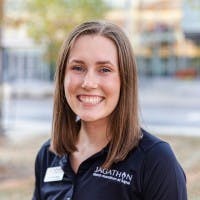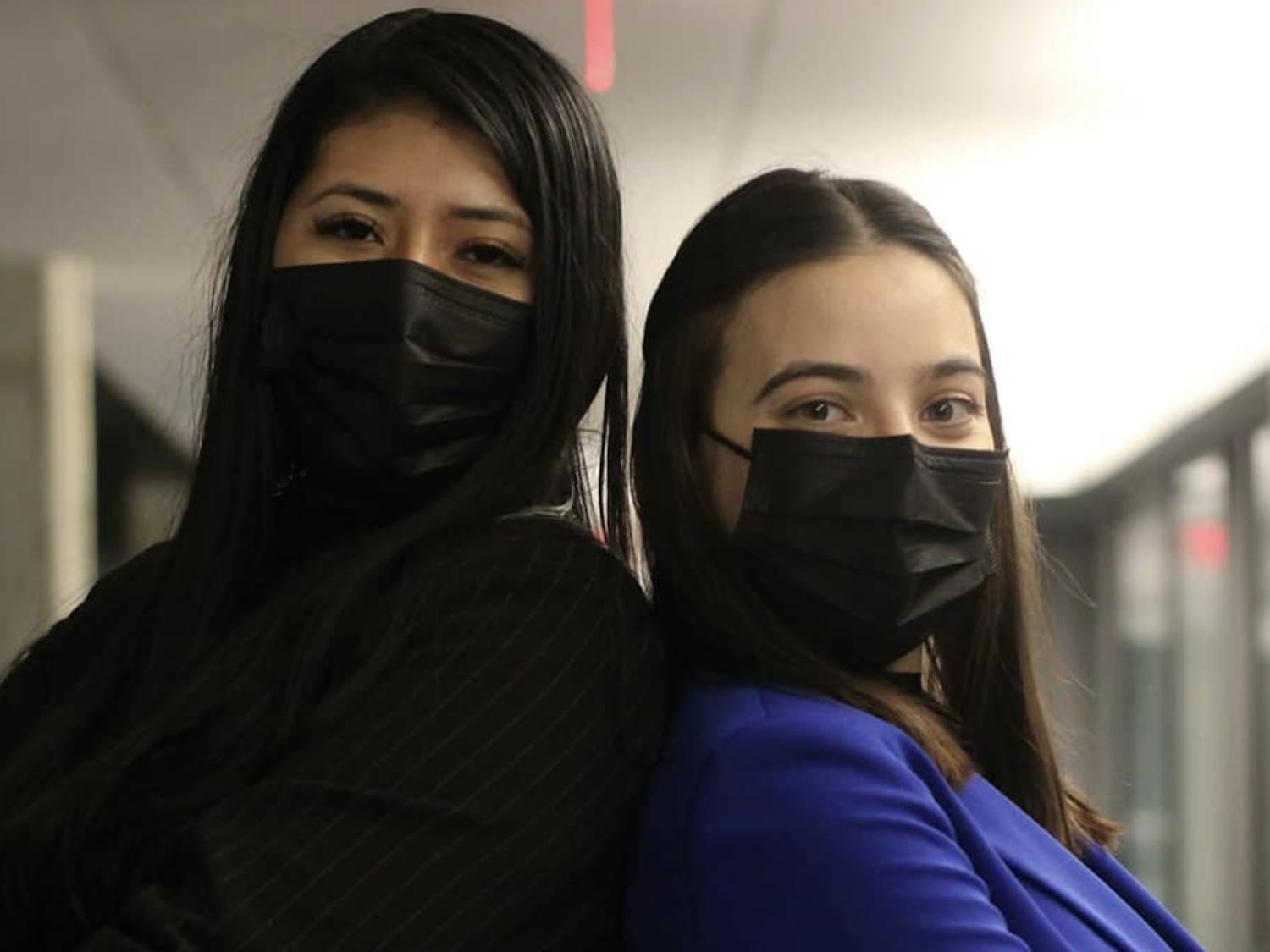Should you take a gap year before moving on to postgraduate education?
This is a question that every pre-professional student has had to or will grapple with, especially as many consider scheduling standardized admissions tests for their professional program of choice. A few of these include the Medical School Admissions Test (or MCAT) and the Dental Admissions Test (or DAT).
One such student, Olivia Hibbs, fourth year pre-dental student and veteran BIOL-K 103 Recitation leader, will be taking the DAT this spring and applying to dental school next fall.

Olivia Hibbs, IUPUI Senior | Photo courtesy of Olivia Hibbs
Jacob - “So when did you decide to go to dental school, and what influenced that decision?”
Olivia - “Well, I made the decision to go to dental school my junior year at IUPUI. I was influenced by my own personal dentist and my passion for healthcare and science. I think dentistry is a wonderful outlet for creativity and it’s a very hands-on occupation that provides a daily challenge. I also want the opportunity to participate in people’s lives in a positive way and just bring people a reason to smile.”
Jacob - “What made you decide to take a gap year?”
Olivia - “I decided to take a gap year in order to save up money, gain some serious experience in the field before committing to the occupation and to have more time to study for the DAT.”
Jacob - “Do you have any advice for younger pre-professional students?”
Olivia - “My advice. . . would be to shadow as many people as you possibly can; hopefully that time spent will reaffirm that you are doing something you enjoy!”
Every student is different, of course, and there are a thousand different things that have to be considered when deciding the best path to take.
One obvious benefit of taking a gap year is putting off the brutal seven-hour MCAT (or four-hour DAT) another year. One obvious drawback is adding another year to the already long educational process involved in becoming a doctor, dentist or other healthcare professional.
Personally, coming into college with plenty of AP credits, I had considered graduating early for some time. I had not considered using my senior year as a gap year until recently, realizing it would be a great way to make some money and reduce the pressure associated with early medical school applications.
A few things had me concerned. Did I really know what I wanted to do? I had been pretty confident that I wanted to be a neurologist or neurosurgeon after taking AP Psychology my junior year of high school. I later developed an interest in helping children with neurodevelopmental disorders. But would my application be good enough?
I was still weighing the options of either getting a regular M.D. or pursuing a M.D./Ph.D. For those unfamiliar, an M.D./Ph.D. program, like the Medical Scientist Training Program we have here at the IU School of Medicine, pays for eight years of schooling, the first and last two to get an M.D. and the middle four to get a Ph.D. This kind of education would be ideal for those interested in pursuing a career focused on research with a clinical base. A typical M.D./Ph.D might work three or four days in the lab and two days with patients in an academic or research hospital setting. The typical M.D./Ph.D. also makes significantly less than the typical M.D.
So, I decided to meet an M.D./Ph.D. student involved in my lab, completing a fellowship in computational neuroscience, for coffee one day in the Campus Center. She advised me that since my interests were more aligned with translational and clinical research, an M.D. would probably work better for me. She also estimated around 50% of her class were non-traditional students (i.e. students that may have taken many, many gap years), although she was not one of them. She also said that graduating in three years and going immediately into medical school was, in fact, possible, among many other helpful things.
My other concern with graduating in three years was that I would lose my fourth year of scholarship money. Most financial aid programs work similarly, in that you are covered for four years of undergraduate education and no more. If you don't use it, you lose it (much like muscles or synaptic connections in your brain). One notable exception is the Fast Track program for Frank O' Bannon or 21st Century Scholarship recipients, who are able to use their award money at an accelerated rate (to pay for summer classes, for example), if they plan on graduating early. The Child of a Disabled Veteran (CVO) Grant work similarly, in that they will pay 124 total credit hours at the in-state public tuition rate, regardless of when you take these credits or what undergraduate or professional program you are in.
If I decided to take a gap year, however, the increased amount of time I would be able to work as a Patient Care Technician or other part-time entry-level job would more than cover this discrepancy. Nevertheless, the long-term impact of entering the workforce with an M.D. a year earlier would be far more financially beneficial than either of the other two options.
As of now, I’ve decided to take a few more summer classes to make sure I can be prepared for the MCAT next spring and have enough credits to graduate in that three-year period. Hopefully, I'll be able to matriculate directly into medical school.
What are some things that you might consider before deciding whether or not to take a gap year?
First of all, consider what your interests are. If you don’t know, your undergraduate years are the perfect time to figure it out. Get involved in labs. Shadow many, many physicians. Learn as much as you possibly can about yourself to determine where you would be the most happy. You can still make a difference in other people’s lives without going through medical school. I’m reminded of several alumni who started out as pre-med students, but decided that non-profit work or another healthcare occupation was more fulfilling after participating in Jagathon: IUPUI’s Dance Marathon.
One such student, Junior and Chemistry Major Madeleine Wisler, Jagathon's Director of Family Relations, is planning on getting her master’s degree in Genetic Counseling.

Madeleine Wisler, IUPUI Junior | Photo Courtesy of Jagathon: IUPUI's Dance Marathon
Jacob - “Do you have any advice for younger pre-professional students?”
Madeleine - “Yes! Talk to students from the schools you’re interested in to hear about their experiences, and their thoughts about how the school supports them. Some schools have different focus areas and making sure they align with what you’re looking for is important!”
It’s important to note that there is a lot that can be done within the healthcare field that does not require an M.D., genetic counseling being one such example. Ultimately, it’s best to do something that you enjoy and that fulfills you.
Secondly, consider your grades. If freshman year was a rough transitional period academically, as it was for many of us, consider using your senior year as an opportunity to boost your overall GPA as well as your science GPA.
Thirdly, consider if you’re ready for the standardized tests required for your program of choice. Technically, you can take the MCAT up to seven times in your lifetime, but you’re not going to want to take it more than twice.
Fourthly, realize that there is a lot that goes into making a decision about medical school. You’re probably going to want to stay at a public, in-state school if you can to avoid out-of-state tuition rates (which almost double the price in many cases, except for a few out-of-state schools in, for example, Texas). Ideally, that means going to IU School of Medicine, early admissions if your application is good enough. Most people would advise you, especially in the regular applicant pool, to selectively apply to multiple medical schools to maximize your chance of acceptance. Talk about these things with the people you care about and bring them in on your decision.
However, it's still not that simple. There are nine campuses at IU School of Medicine, each with a different specialty, including one in Bloomington (Human Sexuality and Health/Medical Education), Indianapolis (Public Health among many other things), Evansville (Quality and Innovation in Healthcare), Fort Wayne (Health Integration and Healthy Aging), Muncie (Health Promotion and Disease Prevention), South Bend (Ethics, Equity, and Justice), Terre Haute (Rural Health), West Lafayette (Biomedical Engineering and Applied Medical Technology), each with their owns strengths and learning environments. Their combined enrollment makes IU School of Medicine the largest medical school in the country.
If you are considering going into primary care, consider that the Federal Government and/or Indiana will pay for your college if you agree to work in a low-income or underserved community for a certain amount of time. If you’re interested in joining the military, consider applying to the Health Professions Scholarship Program of your preferred branch (or similar programs connected with the National Guard, Reserves, or Department of Veterans Affairs).
Fifthly, make connections now. Talk to your professors. Talk to researchers. Talk to doctors. Often they have great advice for students willing to listen. Watch my interviews with Dr. Wade Clapp, M.D., former head of the MSTP program and current physician-in-chief of Riley Hospital, and Dr. Susan Walsh, Ph.D., head of a Forensic Genetics laboratory on campus, for some great advice from people who have gone through the process of getting an advanced degree.
If you have any questions about the journey to medical school or might be interested in getting involved in a lab or other organization on campus, but are not sure where you might fit in, feel free to email me at stewar1@iu.edu and I would be happy to help.
Jacob Stewart (he/him) has been writing for the Campus Citizen since October of 2021. He is just another application on the desk of a medical school admissions officer, waiting to be accepted for once in his life. He has absolutely no interesting qualities or hobbies whatsoever, he kind of just wandered in here and is not sure what is going on.





